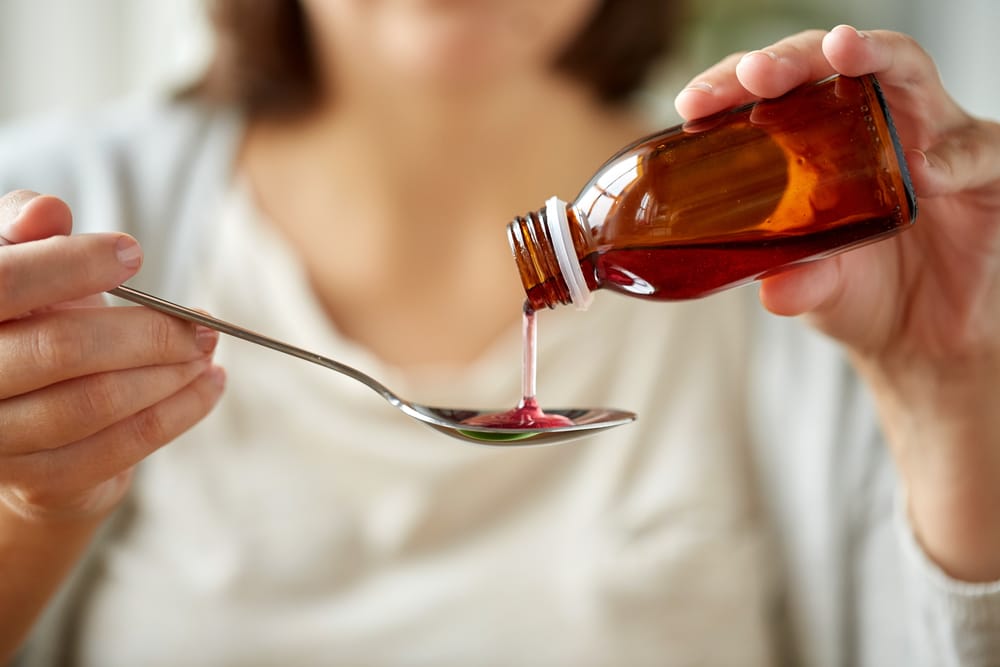If you’ve ever been asked to show your I.D. when purchasing cough medicine for yourself, you’ve likely taken dextromethorphan. Dextromethorphan, or DXM, is a drug commonly found in over-the-counter cough and cold medicines. It’s also gained a reputation for drug misuse, especially in teens and young adults.
Why Do People Abuse Dextromethorphan?
When taken as instructed, dextromethorphan helps suppress coughing as a symptom of the common cold or flu. It may also cause drowsiness and when taken in quantities beyond the recommended dosage, it can have intoxicating effects similar to being drunk or mimic the psychedelic qualities of PCP. At higher doses than recommended, dextromethorphan can cause the following symptoms:
- Euphoria
- Thought dissociation
- Distorted visual perceptions
- Feeling disconnected from one’s body
- Hallucinations
- Emotional ambivalence
- Speeding up or slowing down of sensory input
The Risks of Dextromethorphan Abuse
Dextromethorphan abuse can have serious consequences. Some of these include:
- Blackouts
- Constipation or diarrhea
- Vomiting
- Hallucinations
- Rashes
- Drowsiness
- Nervousness and agitation
- Respiratory depression
- Vision problems
Research has shown that people may experience acute impairments in episodic memory, attention, working memory and metacognition up to six hours following ingestion of higher-than-recommended doses. The dangers of dextromethorphan abuse increase when combined with alcohol, prescription drugs or illicit drugs. According to The National Poison Control Center, misuse of DXM accounts for approximately 6,000 emergency room visits a year.
Street Names for Dextromethorphan
Though an ID is required to purchase over-the-counter drugs that contain dextromethorphan in many states, it’s still relatively easy to obtain and makes it a popular drug to abuse among teens and young adults. Common street names for dextromethorphan include:
- Dex
- DXM
- Robo, robo-dosing and robo-tripping
- Poor man’s X
- Orange crush
- Velvet syrup
- Red devils
- Tussing
- Dexing
- Skittles or skittling
Dextromethorphan is found in over 120 forms of cough and cold medicines, like Robitussin, Tylenol Cough & Cold, Vicks Dayquil/Nyquil, Alka Seltzer Plus and Sudafed.
Is Dextromethorphan Addictive?
Dextromethorphan is not addictive when taken in the recommended doses. While there’s little research documenting dextromethorphan addiction, it’s generally thought to be psychologically addictive when regularly abused in large quantities. However, there are a handful of case studies that suggest it’s possible to develop a physical dependence on the drug. Here are brief summaries of two studies:
- A 2010 German case study presented evidence for dextromethorphan addiction in a 44-year old man. He ingested around 1800 mg of the drug daily for over six years. The man exhibited signs of addiction such as neglecting family, work and social obligations. He experienced physical withdrawal symptoms when he tried quitting and also when he eventually entered treatment for dextromethorphan abuse.
- Researchers from SUNY Stony Brook University authored a case study on a 66-year old recovering alcoholic who abused dextromethorphan when she began having problems with her marriage. She reported needing more DXM to get the same effects, eventually ingesting around 16 ounces a day. When she was admitted to the hospital, she was experiencing trembling and other withdrawal symptoms. She continued to experience dextromethorphan withdrawal symptoms in treatment and required medical detox to stabilize.

